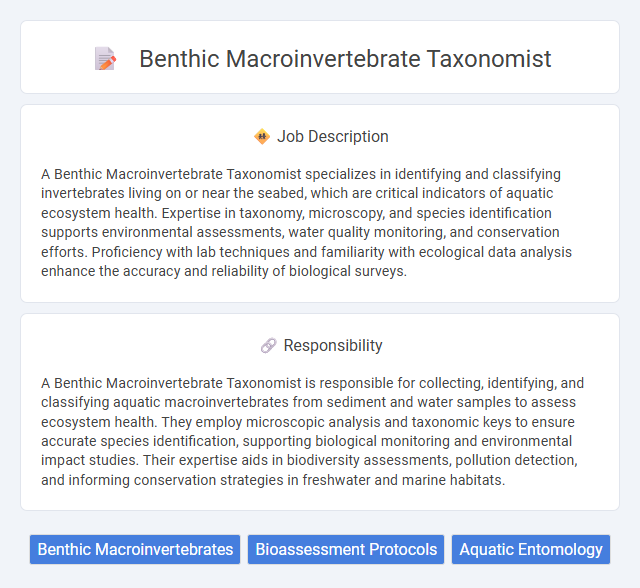
A Benthic Macroinvertebrate Taxonomist specializes in identifying and classifying invertebrates living on or near the seabed, which are critical indicators of aquatic ecosystem health. Expertise in taxonomy, microscopy, and species identification supports environmental assessments, water quality monitoring, and conservation efforts. Proficiency with lab techniques and familiarity with ecological data analysis enhance the accuracy and reliability of biological surveys.
Individuals with strong attention to detail and a passion for aquatic ecosystems will likely find a career as a Benthic Macroinvertebrate Taxonomist suitable. Those comfortable with rigorous laboratory work and field sampling might adapt well to the demands of identifying and classifying freshwater invertebrates. People who prefer solitary tasks and analytical challenges may have a higher probability of job satisfaction in this role.
Qualification
A Benthic Macroinvertebrate Taxonomist must possess advanced knowledge in aquatic biology, taxonomy, and ecology, typically holding at least a bachelor's degree in biology, environmental science, or a related field, with many employers preferring a master's or doctoral degree. Proficiency in identifying and classifying macroinvertebrate species through microscopic examination and familiarity with relevant laboratory techniques and data analysis software are essential skills. Experience in field sampling, water quality assessment, and a strong understanding of freshwater ecosystems enhances job performance and qualification.
Responsibility
A Benthic Macroinvertebrate Taxonomist is responsible for collecting, identifying, and classifying aquatic macroinvertebrates from sediment and water samples to assess ecosystem health. They employ microscopic analysis and taxonomic keys to ensure accurate species identification, supporting biological monitoring and environmental impact studies. Their expertise aids in biodiversity assessments, pollution detection, and informing conservation strategies in freshwater and marine habitats.
Benefit
A Benthic Macroinvertebrate Taxonomist position likely offers the benefit of contributing to environmental monitoring and ecosystem health assessments, which can provide a strong sense of purpose and job satisfaction. The role may also provide opportunities for professional development through hands-on experience with diverse aquatic species and advanced taxonomic techniques. Employment in this field could include benefits such as stable government or research funding, which might support long-term career stability.
Challenge
The role of a Benthic Macroinvertebrate Taxonomist likely involves significant challenges related to accurately identifying diverse and often cryptic species within sediment samples, which requires extensive expertise and attention to detail. The complexity of varying habitats and environmental conditions may present difficulties in consistently classifying specimens, potentially impacting data reliability. Navigating taxonomic ambiguities and staying updated with evolving classifications probably demand continuous learning and adaptive problem-solving skills.
Career Advancement
Benthic Macroinvertebrate Taxonomists analyze aquatic ecosystems by identifying and classifying invertebrates, playing a critical role in environmental monitoring and biodiversity assessments. Career advancement opportunities often include progressing to senior taxonomist roles, leading research projects, or transitioning into environmental consultancy and policy development. Expertise in molecular techniques and data analysis enhances prospects for leadership positions within environmental agencies and academic institutions.
Key Terms
Benthic Macroinvertebrates
Benthic macroinvertebrate taxonomists specialize in identifying and classifying aquatic organisms such as insect larvae, crustaceans, mollusks, and worms found on the sediment surfaces of freshwater and marine ecosystems. Their expertise supports ecological assessments, water quality monitoring, and biodiversity studies by analyzing species diversity and abundance indicators sensitive to environmental changes. Mastery of morphological and molecular techniques enables accurate identification crucial for conservation efforts and habitat restoration projects.
Bioassessment Protocols
Benthic Macroinvertebrate Taxonomists specialize in identifying and classifying aquatic invertebrates critical for bioassessment protocols that evaluate freshwater ecosystem health. These professionals apply standardized methods such as EPA's Rapid Bioassessment Protocols (RBP) to analyze species diversity and pollution tolerance indices, providing essential data for water quality monitoring. Expertise in microscopic examination and taxonomic keys ensures accurate species identification, supporting environmental impact assessments and regulatory compliance efforts.
Aquatic Entomology
Benthic macroinvertebrate taxonomists specialize in identifying and classifying aquatic insects and other invertebrates within freshwater ecosystems, crucial for monitoring water quality and ecosystem health. Expertise in aquatic entomology enables precise assessment of species diversity and population dynamics, informing environmental impact studies and conservation strategies. Proficiency in microscopic identification, taxonomic keys, and ecological data interpretation supports robust bioassessment protocols and sustainable water resource management.
 kuljobs.com
kuljobs.com